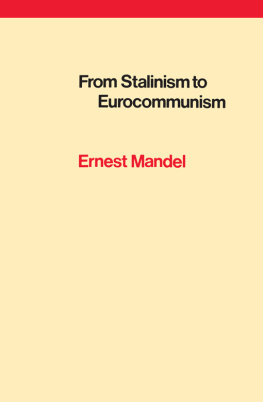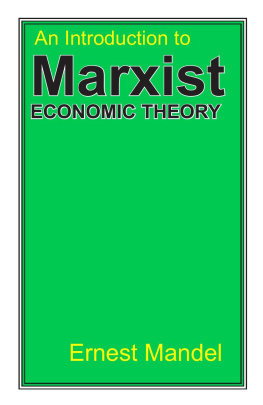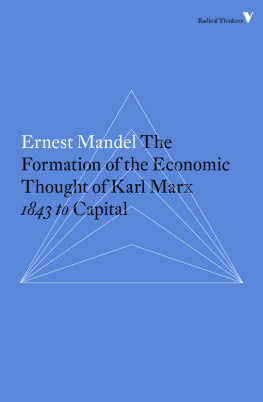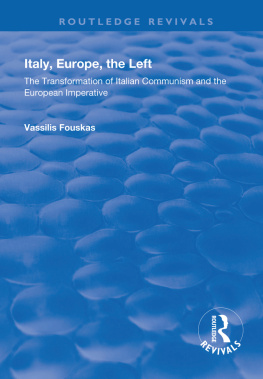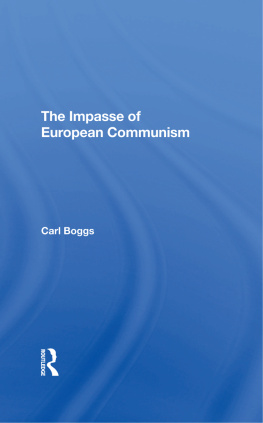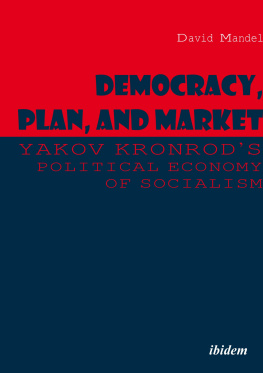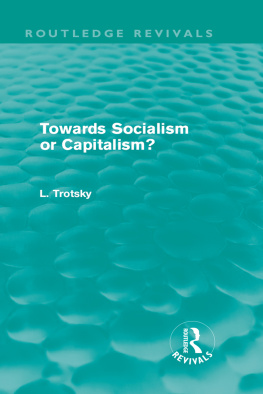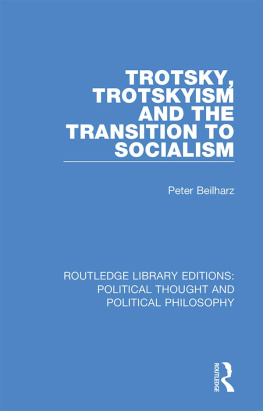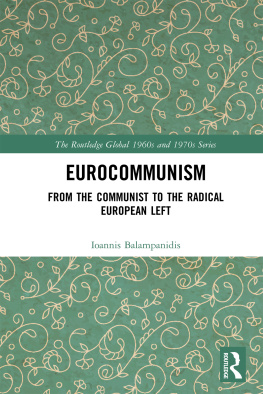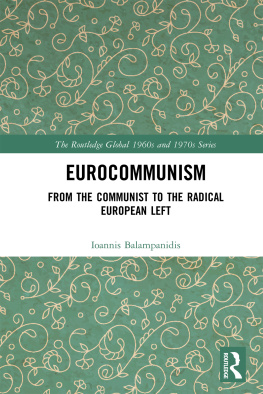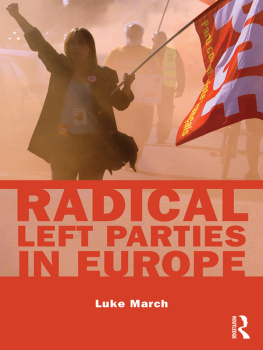The present work consists of eleven essays on Eurocommunism, five of which were drafted at varying times and published in the magazine Inprecor (namely ). They have been slightly revised so as to constitute a whole with the six other essays, written specially for this book. In spite of the various dates at which they were written, we think these essays represent a coherent analysis of Eurocommunism, covering its distant historic roots, its present role within the deep crisis now shaking capitalist society in West Europe, its connection with the disintegration of Stalinism, and its repercussions within the USSR and the Peoples Democracies.
E.M.
The Bitter Fruits of
Socialism in One
Country
On the eve of the First World War, the Second International represented a vast and impressive political force. It had millions of members in Europe. It possessed hundreds of deputies in the various parliaments. It mobilized enormous crowds in public meetings and demonstrations, particularly against militarism and the threat of war. Socially, politically, and morally, it appeared to embody resistance to the cataclysm taking shape on the horizon.
At the Stuttgart Congress of 1907, the Second International, after heated debate, adopted a crystal clear formula: Should war break out despite everything, it is the duty of Socialists to act for its rapid conclusion and to work with all their strength to utilize the economic and political crisis provoked by the war to rouse the peoples and thus accelerate the abolition of the rule of the capitalist class. Similar formulas were voted by the congresses of Copenhagen (1910) and Basel (1912). Indeed, up to 27 July 1914, the major Social Democratic Parties continued to swear that they would oppose the war by any means necessary. Then, on 1 August 1914, a sudden volte-face was made in all the major European powers (with the exception of Italy, which remained neutral). Under the pretext of national defence, Social Democracy in each country plunged into virtually unqualified support of the enterprise of plunder by its own imperialist bourgeoisie for that is what the war objectively represented for each of the capitalist powers that unleashed it.
The traumatic shock of this sudden turn for the revolutionary left of the workers movement was profound and lasting. It took the form not merely of a more thorough settling of accounts with the opportunist, reformist, and revisionist currents within Social Democracy, which had for many years objectively paved the way for class collaboration and sacred union. It also took the form of a profound internationalist reaction.
Of course, neither at the time nor subsequently were Marxists unaware that the open passage of Social Democracy into the camp of the imperialist bourgeoisie had many social roots. The change could not be explained solely as an ideological and political degeneration. For this degeneration was itself the product of a mounting integration of the bureaucratized apparatuses of the mass parties and trade unions into bourgeois society.
The multiplication of benefits the officials of the Social Democratic parties enjoyed within the bourgeois-democratic state eventually created a community of interest between these officials and the bourgeoisie. The considerable rise in the living standard of the privileged layers of the working class fostered a political atmosphere in which the minimum programme (the immediate demands) of these parties was increasingly separated from the maximum programme (the overthrow of the capitalist system). Other political and theoretical weaknesses also undoubtedly paved the way for the August 1914 catastrophe: absence of any overall understanding of the nature of the era of imperialism; refusal to orient to great mass mobilizations outside parliament (the position advocated without success by Rosa Luxemburg as of 1910); lack of revolutionary perspectives and inability to modify gradualist tactics when violent shocks later became inevitable.
But while they cannot be considered decisive, the absence of international discipline and the lack of any tradition of actually applying the resolutions adopted by majority vote at the congresses of the Second International must be counted among the major factors that contributed to the spectacular reversal of the principal socialist parties at the end of July 1914.
Lenin was not alone in proclaiming that the Second International was dead and that a Third International would now have to be built, on a much firmer doctrinal and organizational This concept was not the product of the October Revolution, the predominance acquired by the Bolsheviks with the founding of the Comintern, or of any inclination of Lenins to extend Russian organizational conceptions throughout the entire world. It was the common patrimony of all internationalists, whether Bolsheviks or not, from 1915 onwards. It was the nearly unanimous reaction to the catastrophe that struck the European workers movement in August 1914.
But it was also more than that. It was a conviction which conformed to a more correct theoretical view of the trend towards the internationalization of the class struggle in the imperialist epoch. The notion of world revolution, which before 1914 had floated vaguely in the background of orthodox Marxism like a memory of what had happened in 1848, or at most was viewed as a tendency for revolutions to spread from one to several countries, now acquired a burning actuality as the organic and contradictory unity of the world economy forged by imperialism became patent.
Nearly all revolutionary Marxists correctly rejected the utopian notion that revolutions would break out simultaneously in all the major countries of the world. (Behind its radical appearance, this idea merely supplied an excuse for the reformist and centrist refusal to struggle for the conquest of power by the proletariat in each country, whenever the relationship of political and social forces permitted.) But they understood the inevitable interlacing of various processes: revolutions conquering power in one or several countries and then facing the international intervention of the bourgeoisie, including military intervention; temporarily victorious counter-revolutions in other countries, which would significantly sharpen the contradictions confronting a temporarily isolated victorious proletariat; the international radicalization and exacerbation of the class struggle in the wake of victorious revolutions and counter-revolutions; the economic effects of such class struggle on the medium- and long-term development of the cycle of the world capitalist economy and the repercussions of this cycle on the class struggle itself. Further, they understood that the conflicts between imperialism and oppressed nations (primarily, but not exclusively, those of the colonial and semicolonial countries) would be integrated into this entire complex.

